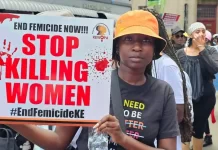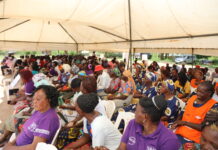By Tebby Otieno
Nairobi, Kenya: Jackie Mwangi believes that if given a chance, she will spur change in Kenya’s political space. A Kenyan advocate who developed an interest in politics from childhood who is dedicated to joining other fearless women in Kenyan politics narrates about her journey.
“I have loved politics from when I was a young girl. Then we never used to watch television much but we used to read a lot of newspapers and also my family has a lot of interest in politics. We always discuss politics in our family” Says Mwangi.
She is a sole proprietor at Wanjiru Mwangi Advocates, located in Thika town, a Kenyan town 45Km away from the country’s capital city Nairobi.
She vied for the Member of County Assembly (MCA) seat in Nairobi in the 2017 general elections. The seat had about ten aspirants with only two being women. The culture of campaigning was dictated by money.
“I’m your child, I have grown here, I have schooled here you know me so why do you want me to give you something (money) so that I can convince you that I can lead? “Said Ms. Mwangi, mimicking how she used to campaign “I felt that the society was very unfair.”
All political parties in Kenya have nomination fees as a requirement from candidates vying for various seats. This amount varies from party to party. For example, in 2017, candidates who vied through Maendeleo Chap Chap party paid as follows: Presidential candidates Ksh. 1, 000, 000, gubernatorial candidates Ksh. 250, 000, Woman representative candidates Ksh. 100,000, senatorial candidates Ksh. 100, 000 while Members of National Assembly candidates paid Ksh 150, 000 and Members of County Assembly candidates paid 20, 000. The party however gave a 25% discount on women, people with disabilities, and youth.

“They should scrap nomination fee and make it free for women and youth who want to become leaders. This will bring more women to the table. Even if you don’t win, you know it encourages when you see a list with so many women fighting for a certain position together with men, but now when you can point out two, one, or nil then that tells you there is something that has not yet been done. “Mwangi adds.
We learned that in situations where two or more candidates are interested to vie for the same seat using the same political party, nomination fees are then used to select the best-suited candidate through polls. This money is also used to procure stationery, ballot boxes, and also to engage clerks during party primaries.
Other than structural and cultural barriers, situational barriers have also proven to be a hindrance for women to join politics and Mwangi was not an exception.
“I can say politics in Kenya for women is tough and not because you are unable or you don’t have the capacity as a woman. It is because most people have not appreciated the fact that women can lead.” She says adding, “Then I was a young mother and I can also say I was a young wife trying to juggle between being a mother, being a wife, and also I had started my Masters. I had all these things pressuring me and also by the fact that I didn’t have a stable job. So I was just there, no resources but with a dream, so that was very challenging.”
Mwangi appeals to Non-Governmental Organizations (NGO) and political party leaders to support their candidates with campaign materials. This will see more women in politics.
“This is what I always tell people. If I had financed, then that seat could have been mine. Because you need money to campaign and I think most women that are the main barrier. When you have finances you will be able to get security. You know it revolves around finances and that is why you see men have more muscle when it comes to politics because it is true men have money more than women and it’s a fact we can’t run away from.” She says.

A gender analysis of the 2017 Kenya general elections, gazetted by The Independent Electoral and Boundaries Commission (IEBC) indicates that of the 1, 862 persons duly elected, 172 were women (9%). Among them were three governors, three senators, 23 members of the National Assembly, 47 women Member of the National Assembly, and 96 Members of the County Assembly.
Interventions
The Kenya Women Parliamentary Association (KEWOPA) is a membership association of all women parliamentarians drawn from across all political parties both elected and nominated in the Senate and National Assembly.
KEWOPA-Secretariat program manager, Rosemary Juma says the association has consolidated efforts in fundraising, lobbying, and advocacy, researching and defending the position of women.
“Women in politics and leadership are the roadmap to development equality and gender justice in decision making. By having them in leadership, particularly debating how income comes to the government and how incomes are distributed, gender-sensitive considerations will be input” Ms. Juma describes.
KEWOPA also faces challenges in promoting women’s presence in politics. Among them is the lack of reliable resources and autonomy to make independent decisions of the members or stifled secretariat.
Despite the challenges, Ms. Juma says years to come, Kenya will have gender justice in politics and successful women-run, women-led political parties.
“I see a country where women leaders proactively propose laws and legislations that are good for the economy and families as a basic unit. Women leaders fiercely defending positions for the common good of the society.” She notes.
According to the UN WOMEN tally of women in politics as of January 1st, 2020, Kenya is ranked at 58th in the world and 26%. It is 92nd in the world with women in parliament at 21.8%. 76 out of the 349 seats (30.9%) and 21 out of 68 in the upper house or senate.
According to KEWOPA-Secretariat, this is because of the attitude the country has towards women.
“Kenya is certainly lagging behind. There is more politicking, political alignment compared to women alignment. Despite the good laws, we lack the goodwill to push implementation to the letter. There also exists a poor reading culture that leads to poor decision-making. “She says.
With 2022 general elections nearing in Kenya, KEWOPA-Secretariat looks forward to more women being elected equally as men.
“We want equality at 50/50 if possible but most importantly we want equity so that women are taking part in decision making and making impactful changes to our society because we have powerful women who are movers and shakers.” She expresses her expectations.
Kenya is currently debating on two-third gender rule in parliament. However, efforts to achieve gender representations have been ignored. An example is when the former chief justice David Maraga, advised President Uhuru Kenyatta to dissolve Parliament under Article 261 (7).
“The petitions are based on the ground that, despite four Court orders compelling Parliament to enact the legislation required to implement the two-thirds gender rule in accordance with Article 27 (3) read together with Articles 81 (b) and 100 of the Constitution, Parliament has blatantly failed, refused and/or neglected to do so. Your Excellency, the two-thirds gender rule is an acronym for the constitutional imperative which prohibits any form of discrimination in the appointive and elective positions in our country on the basis of one’s gender” Partly reads former Chief Justice’s advice to the President on the dissolution of parliament for failure to enact the gender rule.
Trainer on leadership with interest in gender equality, justice, and rule of law, Desmond Ogubi recommends that two-third gender rule be embraced in programmatic areas. This according to him requires robust advocacy campaigns from the grassroots and capacity building on why it is actually important to pass the motion.
“We need to create more platforms where we can encourage more women to be part of this conversation. Two-third gender rule has not been passed in Kenya because of a lack of political goodwill. It is very important that as a country we tap into the expertise of both men and women and bring them together and synergize those two efforts and ensure that we move forward” He recommends.

A report published by NDI and the Federation of Women Lawyers (FIDA Kenya) in 2018 shows that despite the gains made in the 2017 general elections, women’s actual representation fell short of the one-third women threshold as Kenya’s constitution mandates.
The election of 26 women to parliament represented the growing number of women in parliament that has continued since the 2002 election and changed markedly since the 2010 Constitution. In 2002, 4 women were elected to parliament, increasing to 16 women in 2013 and 26 women in 2017.
Political analyst, Moses Phillip Dananyeno Sakondo, says “African women must identify their unique talent and leadership treats, understanding what they bring to leadership terrain in order to be successful, and then ensure that their voices are heard. However, African men should avoid superiority complex and support their women in positions of leadership”
He adds that to eliminate barriers that prevent women from elected office at every level of politics not only in Kenya but other African countries as well, there have to be serious investments.
“African countries should provide robust mentorship in leadership for capable women. They should put in place legal frameworks that promote gender-inclusive governance at all levels of government. To realize Africa’s potential, we must invest reasonable resources in the empowerment of women’s organizations and women leaders” Says Sakondo.
Whether the number of elected women in Kenyan parliament will increase in 2022 is pegged on whether by then the two-third gender rule will have been passed.














